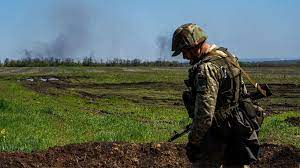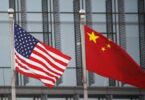Matthew Sussex
The war in Ukraine is approaching a tipping point. Russia’s army has struggled to make meaningful advances after months of trying, unable even to capture the ruined town of Bakhmut. A persistent inability to establish air superiority, low troop morale, and equipment shortages all suggest President Vladimir Putin’s military machine will soon be incapable of mounting meaningful offensive operations.
One key to successful military planning lies in reliably identifying new ways to derive the greatest strategic benefit at the lowest overall cost. Ukraine’s decision to vigorously defend Bakhmut is an excellent example of this, even though it runs contrary to the logic that there was little strategic value in doing so. By throwing its own forces into Bakhmut, Ukraine has tied up a large proportion of the Russian military, inflicting heavy losses. Its approach is both a strategy of corrosion – the gradual attrition of the invader – and absorption, soaking up repeated Russian assaults while taking the pressure off other parts of the conflict zone. This has led to several important payoffs for Ukraine. First, Moscow’s commanders have been unable to shift forces to another axis of advance.
Second, the loss of personnel and materiel means Russia has fewer bodies and less equipment available for its war effort. Third, it has created a buffer to construct Ukrainian defensive fortifications once Bakhmut finally falls. Finally, it has bought time to train and equip its forces for its own counteroffensive operations. One of the most important decisions President Volodymyr Zelensky will have to make is the timing of the counteroffensive. Ukraine’s forces will want to advance under optimal conditions to liberate as much of its territory as possible before winter closes in again. Failure to do so will not only weaken Kyiv’s hand in any peace negotiations but also potentially leave large swathes of Ukraine under Russian control for the foreseeable future. Russia’s forces are aware the strategic momentum will shift once Ukraine counterattacks and have been constructing tank traps, trenches and other defensive fortifications to arrest its momentum. Put simply, it’s absolutely crucial for Ukraine that its counteroffensive succeeds. If it doesn’t, the international coalition that has kept Ukraine in the fight with arms, training, and aid may well come to favor a negotiated settlement.
Domestic politics will inevitably play a role in shaping the United States’ thinking as its election season gains momentum. While both sides of US politics are fairly solidly behind continuing to send weapons and equipment to Kyiv, that may change. Indeed, the surest way to encourage US populist isolationists will be a stalled Ukrainian advance. And since a multinational coalition is only as strong as its weakest link, Ukrainian planners will likewise be anxious not to give Berlin or Paris cause to waver. Besides the need to maintain international support for the full restoration of Ukrainian sovereignty, planning for offensive operations rests fundamentally on Kyiv’s ability to conduct them. Attacking is far more costly than defending. A counteroffensive launched before Kyiv has had the chance to recruit, prepare, arm, and assemble the necessary personnel would peter out quickly. Such a failure would deal a harsh blow to Ukrainian morale, hand momentum back to Russia, and lead to a pointless loss of life. Much discussion of Ukraine’s war needs has centered on tanks and air power. Of course, these are very important, yet neither can hold territory. For that, you need ground forces – and lots of them.
What’s more, many of the likely lines of Ukrainian advance will feature choke points and vulnerable terrain. The retreating Russian army can be counted on to use mines, ambushes and scorched-earth tactics to funnel viable routes for the Ukrainians into impenetrable and risky ones. That means Ukrainian forces will also need specialized equipment and personnel, from bridging units to those specializing in clearing terrain. It’s widely believed that the Ukrainian counterattack will occur around the southeastern Zaporizhzhia region (made famous by its regularly besieged nuclear power plant). But war is about trying to gain strategic surprise, at which Ukraine’s armed forces have shown themselves to be adept. Crimea will remain one of the thorniest problems in the war’s eventual resolution. The official position of the Zelensky government is clear: there can be no peace with Russia until Ukraine is fully restored, which includes the Crimean peninsula seized by Russia in 2014. This is understandable. Any hint of willingness to concede territory signals weakness domestically, to the Kremlin, and internationally. Importantly, Ukraine retains agency. It will ultimately decide on the scope and location of its counteroffensive. But several factors make Crimea a potentially special case. It’s well-defended and hard to assault. There are only about 10 roads linking the peninsula to the Kherson region and Western supporters of Ukraine remain concerned that Putin’s deep personal and political investment in Crimea would make a Ukrainian attempt to recapture it one of the Kremlin’s “red lines” for further escalation. The lead-up to Ukraine’s imminent counteroffensive has so far been patient and careful, focusing on maximizing operational success. With more than a year of evidence to go by, we can expect Ukraine’s armed forces to perform better than their Russian adversaries. Time and again, Kyiv’s approach has been nimble, creative and efficient given limited means. Ukraine’s commanders have also sensibly followed the maxim of not interrupting your enemy while they are making a mistake (perhaps the sole thing Russia’s forces have excelled at).
But the stakes for Ukraine are no less than its national survival. Its success or failure will determine whether its future will revolve around rebuilding a damaged but restored state, or the pain of fashioning an existence in a shattered and partial one. And the repercussions outside Ukraine will be no less solemn, teaching dictators either that expansionism is rewarded, or that it’s a catastrophic mistake.
The Moscow Times







